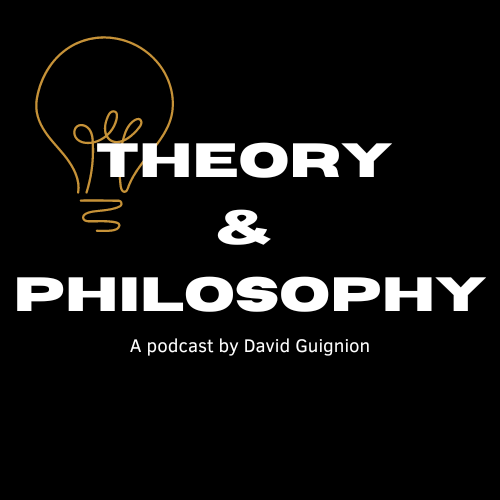

Theory & Philosophy
David Guignion
Welcome! My name’s David Guignion and I distill complicated philosophical and theoretical ideas for wide audiences. While ideas are important to help us understand the world, it is even more important to put ideas into action. Some of this channel’s key theoretical and pragmatic influences include, but are not limited to, Marxism, Decolonialization, Feminism, Gender and Queer theory, and Critical Race Theory.
This channel’s content is recorded on the in Tiohtiá:ke/Montreal, the traditional territory of the Kanien’kehà:ka, comprised of
the Haudenosaunee Confederacy, Huron/Wendat, Abenaki, and Anishinaabeg.
Patreon: https://www.patreon.com/theoryandphilosophy
Youtube: https://www.youtube.com/channel/UCIq2xNjGAof0cCUaKbco6HQ
This channel’s content is recorded on the in Tiohtiá:ke/Montreal, the traditional territory of the Kanien’kehà:ka, comprised of
the Haudenosaunee Confederacy, Huron/Wendat, Abenaki, and Anishinaabeg.
Patreon: https://www.patreon.com/theoryandphilosophy
Youtube: https://www.youtube.com/channel/UCIq2xNjGAof0cCUaKbco6HQ
Episodes
Mentioned books

Sep 21, 2019 • 47min
Jean Baudrillard's "America"
Patreon: https://www.patreon.com/theoryandphilosophy
In this episode, I tackle Jean Baudrillard's "America." This book came out of Baudrillard's travels to America where he observed the desolate nothingness that was the American hologram.

Sep 21, 2019 • 51min
Roberto Calasso's "The Ruin of Kasch" (Part 2/2)
https://www.patreon.com/theoryandphilosophy
In this episode, I conclude my exploration of Calasso's "The Ruin of Kasch" by outlining his criticism of Marxism for failing to consider the possibility that it is society itself that is oppressive, not capital.

Sep 21, 2019 • 51min
Roberto Calasso's "The Ruin of Kasch" (Part 1/2)
Patreon: https://www.patreon.com/theoryandphilosophy
In this episode, I explore the the lesser known Roberto Calasso and his "The Ruin of Kasch." Calasso is a thinker of sacrifice and ceremony, and proposes what these components of the 'old order' mean in the age of modernity. To do this, Calasso traverses from the tale of the ancient kingdom of Kasch to the Napoleonic politician Talleyrand to the limitations of Marxism.

Sep 21, 2019 • 42min
Jean Baudrillard's "Fatal Strategies" (Part 2/2)
Patreon: https://www.patreon.com/theoryandphilosophy
In this episode, I continue my exploration of "Fatal Strategies" to present something of a Baudrillardian pragmatics that accounts for the acceleration of this oppressive system.

Sep 21, 2019 • 54min
Jean Baudrillard's "Fatal Strategies (Part 1/2)
Patreon: https://www.patreon.com/theoryandphilosophy
In this episode, I begin my exploration of Baudrillard's "Fatal Strategies." This is the text that Baudrillard becomes extremely critical against the obscenity machine that forces everything into appearance. Against this, he proposes his own theory--that we are to drive these systems to their radical conclusion. This takes the form of a fatal strategy.

Sep 21, 2019 • 51min
Sara Ahmed's "Differences that Matter" (Part 3/3)
Patreon: https://www.patreon.com/theoryandphilosophy
In my last episode of this text, I focus on the stories and films that Ahmed analyzes as being fundamentally "postmodern," but that rely on classical constructions of women and (not so) subtly maintain oppressive imagery against women.

Sep 21, 2019 • 51min
Sara Ahmed's "Differences that Matter" (Part 2/3)
Patreon: https://www.patreon.com/theoryandphilosophy
In this episode, I continue my exploration of Ahmed's "Differences that Matter" and turn my attention to ethics, and the construction of women in Western Philosophy. Ahmed presents some tough criticisms here, but is equally proficient at constructing her own theoretical approach that stands opposed to the hegemony-laden approaches indicative of Western thought.

Sep 21, 2019 • 43min
Sara Ahmed's "Differences that Matter" (Part 1/3)
Patreon: https://www.patreon.com/theoryandphilosophy
In this episode, I shift gears to explore Sara Ahmed's first book, "Differences that Matter." In this book, Ahmed points to the limitations of postmodern thought to account for those marginalized groups most often affected by structural inequalities.

Sep 21, 2019 • 1h 11min
Gilles Deleuze & Félix Guattari’s “A Thousand Plateaus” Chapter 13: “Apparatus of Capture” (Part 2/2)
Patreon: https://www.patreon.com/theoryandphilosophy
In this episode, Curtis and I continue our exploration of Plateau 13 from A Thousand Plateaus, "Apparatus of Capture." Specifically, we locate the implications of this chapter alongside the advent of algorithms, big data, and technological surveillance.

Sep 21, 2019 • 1h 4min
Gilles Deleuze & Félix Guattari's "A Thousand Plateaus" Chapter 13: "Apparatus of Capture" (Part 1/2)
Curtis Allen, a PhD candidate focusing on Deleuze and Wittgenstein, delves into the intricate themes of Deleuze and Guattari’s work. He highlights the political significance of 7000 BC in shaping early governance structures. The discussion contrasts governance archetypes, the magician emperor vs. the juris priest, and examines how these roles reflect on state power and social justice. Allen reveals the complex interplay between the war machine and state dynamics, challenging traditional views of state sovereignty and organization.


